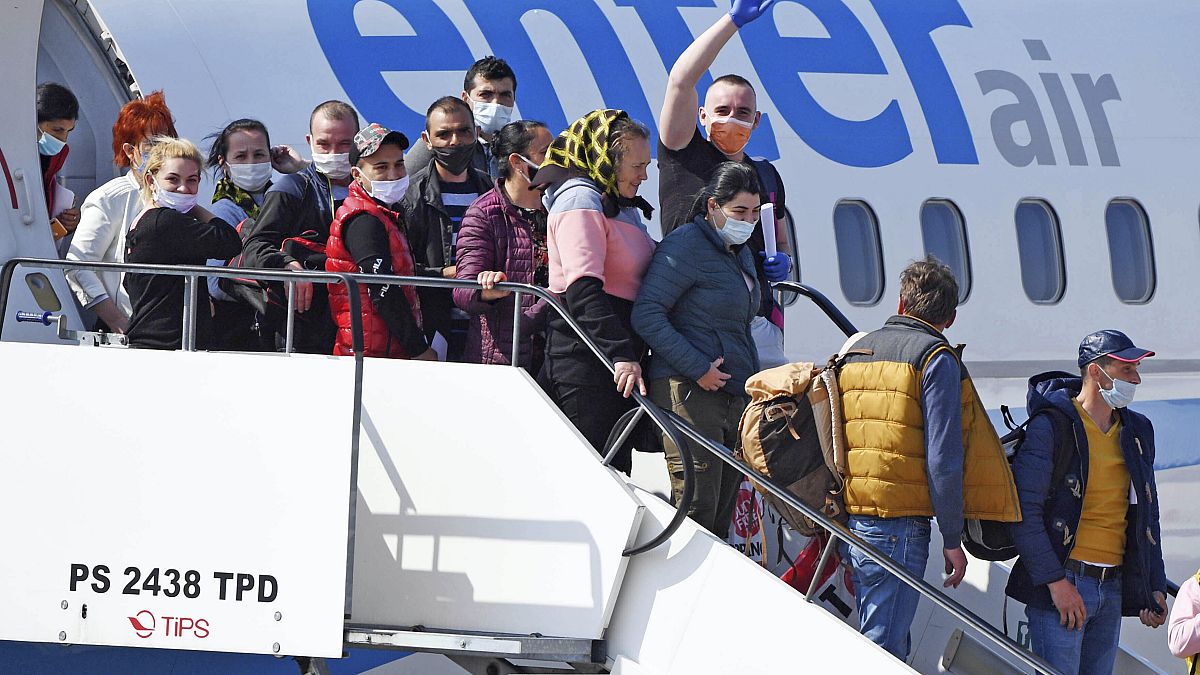Farmers are worried that produce will rot in the fields as restrictions stop migrant workers from coming to pick fruit and vegetables.
Empty shelves and long queues outside supermarkets has got many shoppers concerned about whether they will have enough to eat as the COVID-19 lockdown continues.
But is the absence of pasta or eggs on the shelves due to short supply? Or is it panic-buying?
European governments have warned against hoarding food during the coronavirus crisis, and are now trying to reassure citizens. France's finance minister, Bruno Lemaire, insists that the supply of food is guaranteed in the country.
"There has been no food shortage in France, and there will be no food shortages," he said.
"That is the commitment we made [and is] kept thanks to the exceptional mobilisation of the entire food production chain. I think it is a source of pride for all of us to say that, in France, food safety is guaranteed even in times of crisis".
The supply in staple foods does not seem to be at risk, but with the harvest season coming many farmers have warned they don't have enough people to pick fruit and vegetables.
Migrant workers
The chances are that the strawberries or asparagus you enjoy every year in Spring have been picked by migrant workers.
The supply of fruit and vegetables in Europe relies heavily on seasonal workers brought in from different towns or even countries, but because of the pandemic many of them under lockdown.
Farm unions say two thirds of seasonal workers in France are foreigners who come from central and eastern European countries, as well as from North Africa.
As such, France's agriculture minister has called on the country's "shadow army" to help pick fruit and vegetables, appealing to workers who are currently unemployed because of the lockdown.
Germany is bringing in 40-thousand seasonal workers from Bulgaria and Romania to harvest seasonal crops like strawberries and asparagus.
Lack of EU-wide response
European countries are tackling the labour shortage and the European Commission has urged them to ensure the free flow of freight along “green lanes” with shorter border crossings.
But industry leaders say the absence of unified measures concerning workers means that fruit and vegetagle supplies are now at risk.
One solution could be an EU-wide easing of travel bans to allow more seasonal workers to fill the labour gaps across the bloc.
Philippe Binard, secretary-general of Freshfel, an organisation which represents the European fresh produce industry, is worried farmers will see their produce rot in the fields.
"I think that's a very important problem, it would depend on the member states to provide the rules to move seasonal workers to the right place. If we don't have seasonal workers to pick the product, which are available now, we will produce food waste," he said.
"If we don't prepare our orchards for summer and autumn production then we will have a lack of availability in supermarkets and that could lead to an increase in prices."
Eating local
Food produced in Europe is usually sold around the world, but the pandemic has revealed the weakness of the global supply chain: cargo ships are struggling to set sail, food is going to waste and curfews mean that even staple food like rice and wheat could soon be in short supply.
France's biggest farm union, FNSEA, is calling on people to rethink the way they consume and buy French food.
"What has changed with this crisis is that to think that one can look for food in the four corners of the world is madness," Christiane Lambert, the head of FNSEA, told RTL radio.
"We have to keep our French farming sector that produces in diversity, quantity, quality and safety for all. And above all store to anticipate crises."
Meanwhile, online initiatives to help people eat food produced in their area have flourished in the last few months.
For people living in the Lyon area, in France, the city has created a platform to help consumers find local produce.
